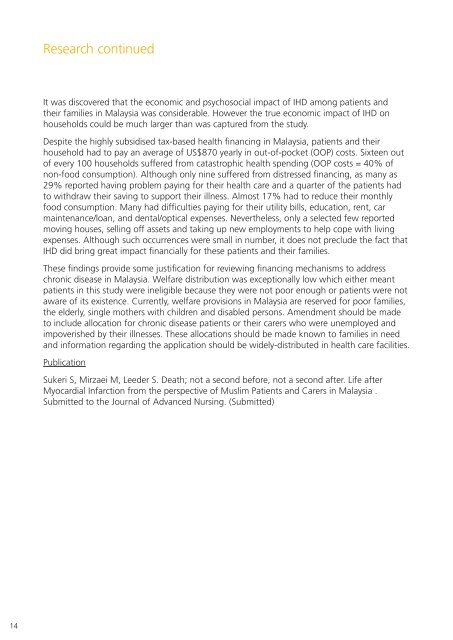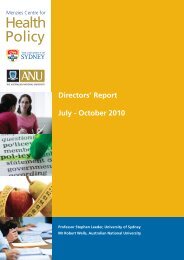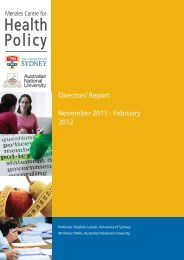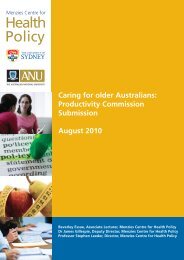Health Policy - Crawford School of Public Policy
Health Policy - Crawford School of Public Policy
Health Policy - Crawford School of Public Policy
You also want an ePaper? Increase the reach of your titles
YUMPU automatically turns print PDFs into web optimized ePapers that Google loves.
Research continued<br />
It was discovered that the economic and psychosocial impact <strong>of</strong> IHD among patients and<br />
their families in Malaysia was considerable. However the true economic impact <strong>of</strong> IHD on<br />
households could be much larger than was captured from the study.<br />
Despite the highly subsidised tax-based health financing in Malaysia, patients and their<br />
household had to pay an average <strong>of</strong> US$870 yearly in out-<strong>of</strong>-pocket (OOP) costs. Sixteen out<br />
<strong>of</strong> every 100 households suffered from catastrophic health spending (OOP costs = 40% <strong>of</strong><br />
non-food consumption). Although only nine suffered from distressed financing, as many as<br />
29% reported having problem paying for their health care and a quarter <strong>of</strong> the patients had<br />
to withdraw their saving to support their illness. Almost 17% had to reduce their monthly<br />
food consumption. Many had difficulties paying for their utility bills, education, rent, car<br />
maintenance/loan, and dental/optical expenses. Nevertheless, only a selected few reported<br />
moving houses, selling <strong>of</strong>f assets and taking up new employments to help cope with living<br />
expenses. Although such occurrences were small in number, it does not preclude the fact that<br />
IHD did bring great impact financially for these patients and their families.<br />
These findings provide some justification for reviewing financing mechanisms to address<br />
chronic disease in Malaysia. Welfare distribution was exceptionally low which either meant<br />
patients in this study were ineligible because they were not poor enough or patients were not<br />
aware <strong>of</strong> its existence. Currently, welfare provisions in Malaysia are reserved for poor families,<br />
the elderly, single mothers with children and disabled persons. Amendment should be made<br />
to include allocation for chronic disease patients or their carers who were unemployed and<br />
impoverished by their illnesses. These allocations should be made known to families in need<br />
and information regarding the application should be widely-distributed in health care facilities.<br />
<strong>Public</strong>ation<br />
Sukeri S, Mirzaei M, Leeder S. Death; not a second before, not a second after. Life after<br />
Myocardial Infarction from the perspective <strong>of</strong> Muslim Patients and Carers in Malaysia .<br />
Submitted to the Journal <strong>of</strong> Advanced Nursing. (Submitted)<br />
14





